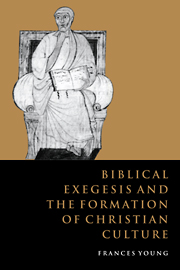Book contents
- Frontmatter
- Contents
- Preface
- List of abbreviations
- Introduction
- PART I EXEGESIS AND THE UNITY OF THE SCRIPTURES
- PART II THE BIBLE AS CLASSIC
- PART III LANGUAGE AND REFERENCE
- PART IV THE BIBLE AND THE LIFE OF FAITH
- 10 The contexts of interpretation
- 11 The life of faith
- 12 The theologian as exegete
- Conclusion and retrospect: towards an outline historical account
- Bibliography
- 1 Index ofbiblicaI references
- 2 Index of modern scholars
- 3 Index of subjects
10 - The contexts of interpretation
Published online by Cambridge University Press: 02 December 2009
- Frontmatter
- Contents
- Preface
- List of abbreviations
- Introduction
- PART I EXEGESIS AND THE UNITY OF THE SCRIPTURES
- PART II THE BIBLE AS CLASSIC
- PART III LANGUAGE AND REFERENCE
- PART IV THE BIBLE AND THE LIFE OF FAITH
- 10 The contexts of interpretation
- 11 The life of faith
- 12 The theologian as exegete
- Conclusion and retrospect: towards an outline historical account
- Bibliography
- 1 Index ofbiblicaI references
- 2 Index of modern scholars
- 3 Index of subjects
Summary
According to one broad-brush picture of the history of exegesis, from Augustine to the Reformation,
theology was practised as the discipline of the sacred page (sacra pagina). The monastery became the place, and the monk's daily liturgy was the context, for the practice of theology.
The ‘sacred page’ ‘bore the imprint of God’, and to get home to God was the goal. So,
[t]heology as commentary served the purposes of the sacred page. Theology, whether expressed in doctrine, liturgy, or catechesis, was the discipline of the sacred page.
However, with the rise of the universities and of Scholastic theology in the twelfth century, there was a shift to ‘sacred doctrine’ (sacra doctrina). Here faith was seeking understanding. Theology took the form of a Summa, rather than a biblical commentary, though interpreting scripture. Then
with the printing press and the scholarship of the Christian humanists, theology shifted to the sacred letter as literature … The study of the sacred letter of Scripture was to lead not so much to God as to a better society, church, education, and government … The rise of historico-critical methods. … continued Humanistic methods.
The account is drawn from an attempt to characterise sixteenth-century commentaries. The conclusion reached is that there was no clear understanding of what constituted a commentary over against annotations, expositions, or paraphrases; but it is possible to distinguish the three styles of interpretation outlined, and to see that commentaries, though similar in being essentially notes on scripture, differed widely according to the manner in which the task was understood.
- Type
- Chapter
- Information
- Biblical Exegesis and the Formation of Christian Culture , pp. 217 - 247Publisher: Cambridge University PressPrint publication year: 1997



